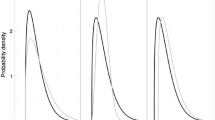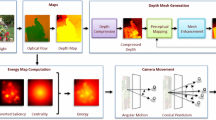Abstract
A recent controversy in the field of depth perception has highlighted an important aspect of model testing concerning a model's complexity, defined as the prior propensity of the model to fit arbitrary data sets. The present article introduces an index of complexity, called the mean minimum distance, defined as the average squared distance between an arbitrary data point and the prediction range of the model. It may also be expressed as a dimensionless quantity called the scaled mean minimum distance. For linear models, theoretical values for the scaled mean minimum distance and the variance of the scaled minimum distance can be readily obtained and compared against empirical estimates obtained from fits to random data. The approach is applied to resolving the question of the relative complexity of the Linear Integration model and the Fuzzy Logic of Perception model, both of which have been the subject of controversy in the field of depth perception. It is concluded that the two models are equally complex.
Similar content being viewed by others
Author information
Authors and Affiliations
Additional information
Received: 10 October 1998 / Accepted: 22 December 1998
Rights and permissions
About this article
Cite this article
Dunn, J. Model complexity: The fit to random data reconsidered. Psychological Research Psychologische Forschung 63, 174–182 (2000). https://doi.org/10.1007/PL00008176
Issue Date:
DOI: https://doi.org/10.1007/PL00008176




